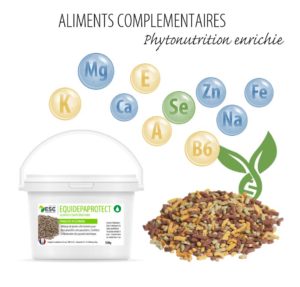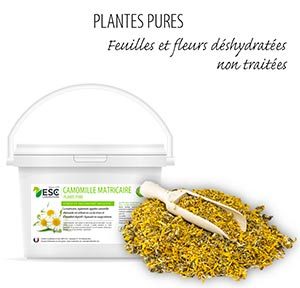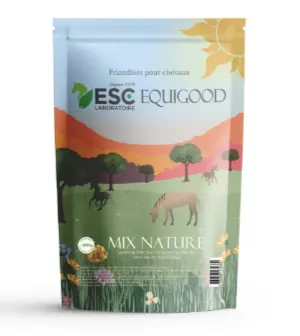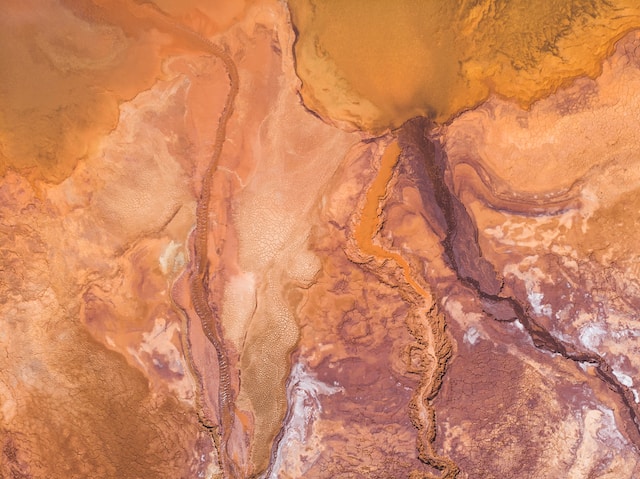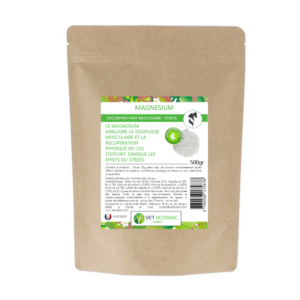Magnesium is a vital mineral for the good health of your horse. It is therefore important that he find enough in his diet, or through supplementation if necessary. In this article, we'll be interested in the role magnesium plays in the functioning of your animal's body, and why complementing it with magnesium chloride can be interesting to support it.
What is magnesium chloride?
Like zinc, copper or iron, magnesium is a metal, and especially one of the most abundant in the universe. Essential to our good health, It is just as important for horses. It is classified in essential macro-minerals where the necessary intake is calculated in grams per day. By comparison, microminerals or trace elements are brought in smaller quantities (mg per day).
In its purest state, magnesium is charged electrically. It is a positive ion that must be combined with two negative loads to stabilize. The whole forms what is called magnesium salts, each type will have its own benefits.
For example, inorganic and organic salts are distinguished. Magnesium chloride falls into the first category. Seawater or brine, magnesium chloride has been recognized for several years for its health benefits. For example, it plays a very important role in the metabolism of the horse and its nervous system. Magnesium chloride is also involved in cell reproduction and calcium fixation.
What are the main sources of magnesium?
Magnesium may be an essential mineral, iis not produced by the body. To meet your horse's needs and avoid deficiencies, you will have to bring it in sufficient quantity, especially in its diet.
In human food, the main sources of magnesium are sea salt, cocoa or seafood. Suffice to say, food that your four-legged companion doesn't take away.. It will draw mainly magnesium from cereals or whole foods distributed as concentrated in addition to hay.
Oats, barley and but, which are the three cereals commonly brought into the equine diet each bring approximately 1 gram of Magnesium per kg of raw cereal. The hay and mineral salts in the water that your horse drinks are also sources, although less concentrated, of magnesium.
Since a 500 kg horse will generally have need 6-7 grams of magnesium per day, it may be necessary to supplement its ration.
What role does magnesium play in horse health?
Magnesium intervenes in More than 300 biological reactions. They are found in bone tissue, muscles, but also in the liver and nervous system of the horse. That is to say, how essential a good magnesium intake is, both for his physical and mental health.
In particular, it has a role to play:
Calming and soothing on the nervous system
Magnesium intervenes ina release of neurological neuromediators Like serotonin. The one that is nicknamed Happiness Hormone participates in particular in regulating stress level. Complementing a fearful or nervous magnesium horse can therefore be a good way to calm down and help relax during work.
Conversely, a horse caressed in magnesium will be more prone to stress. The more stressed he is, the more he will eliminate the last traces of magnesium in his body, triggering a vicious circle. If your horse is anxious (because of a move, for example), it is recommended to boost its magnesium intake.
Muscle booster
Magnesium also plays a major role in operation and recovery of muscles. For example, magnesium deficiency can increase the risk of cramps, hinder mobility and reduce flexibility. You will notice a deficiency by observing slight muscle braiding (which is also well known in humans, especially in the eyelid).
A horse that lacks magnesium will also tend to be more tired. The heart being a muscleHe may suffer from feelings of oppression or heart palpitations. Magnesium chloride supplementation will therefore limit the appearance of its side effects by Mg deficiency. It is particularly beneficial as a result of intense effort (such as a race) or in older horses, which have much less energy.
Stabilizing and solidifying bones
As with other minerals, such as calcium and phosphorus, magnesium is also essential for bone metabolism. Your horse, especially if it is very active, will therefore have a skeleton that will consume particularly minerals to ensure its strength. And so more magnesium needs. Not to mention that Mg is involved, as has already been mentioned, in the fixation of calcium
But also:
- Magnesium contributes to the normal distribution of fat in horses.
- It helps cells react to insulin.
How to complement his magnesium horse?
It can therefore be concluded that the benefits of magnesium are very varied and that it is particularly useful in horses. Let it be to help them overcome a period of stress, recover from an injury or boost their bone metabolism, this mineral must be part of its daily diet, in the form of cereals and/or natural supplements.
A deficiency, even slight, will have an impact on mood and performance Your horse. He will be more nervous, suffer from cramps and can even develop an irregular heart rate and resistance to training.
Rapid-growth grasses are generally poorly concentrated in magnesium and their composition influences the absorption of this nutrient by the horse's body, supplementation may be necessary.
Our magnesium chloride is ideal for relieve muscle tension such as stress from your companion. Just dilute it directly into the water your horse drinks. In case of risk of muscle contracture after intense physical exertion, it can be supplemented witha cure for hippocramps, our vitamin E and selenium supplement.




